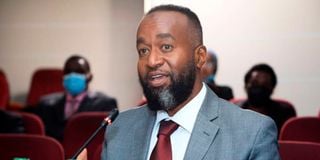Premium
Wanjigi’s beef: Why was Joho cleared by IEBC without varsity degree?

Former Mombasa governor Hassan Ali Joho.
Disqualified presidential hopefuls have found a window of hope in a 2013 High Court ruling that allowed the electoral agency to clear aspirants without university degrees, but on the strength of academic transcripts.
Three barred politicians have vowed to challenge the electoral agency’s alleged skewed application of the law, citing the ruling that could dramatically change the game if applied before the August 9 polls.
The Independent Electoral and Boundaries Commission could find itself entangled in a legal quagmire over its decision to clear Mr Hassan Ali Joho for the Mombasa gubernatorial seat in 2013, though he did not have a degree.
At the time, the High Court directed IEBC to clear Mr Joho on the proof of his academic transcripts and having attended university, even when there was no proof of graduation or availability of a degree certificate.
Justice Isaac Lenaola (now a Supreme Court judge) agreed with Mr Joho’s submission that a degree does not connote a physical possession of a certificate but refers to the certification process which is intangible.
Mr Joho argued that a graduation ceremony and a degree certificate are a mere formality, which confirms that one has qualified for a particular degree. Justice Lenaola agreed, saying a graduation ceremony cannot be used as a measure to determine whether one has a degree or not.
“In my view, what matters is that a person has attended school, undertaken the studies envisaged and has passed all the requisite exams for the conferment of the degree,” the judge said.
Consequently, he said Mr Joho satisfied the qualifications envisaged by Section 22(2) of the Elections Act. “I am therefore in agreement with Mr Joho that a degree is not a physical connotation but is a process whose pinnacle is the graduation,” he ruled.
Ms Janet Mbete, a registered voter in Likoni Constituency, had moved to court challenging the clearance of Mr Joho on the premise that he did not hold a valid degree.
Safina Party leader Jimi Wanjigi, Thirdway Alliance’s Ekuru Aukot and independent aspirant Reuben Kigame have cited Justice Lenaola’s ruling in protesting their disqualification from the presidential race.
Under the banner, “the voice of the people”, Mr Wanjigi said he will be moving to court today to contest his disqualification on Monday.
He said the IEBC’s presidential returning officer, Mr Wafula Chebukati, rejected his application for nomination as a presidential candidate on grounds that he failed to produce a copy of his degree certificate despite presenting his transcripts and completion letter.
Mr Wanjigi argued that the commission set precedence in 2013 when it cleared Mr Joho after he only produced a copy of his clearance letter from the Dean of the School of Business Management Studies at Kampala University.
His running mate, Mr Willis Otieno, added: “After successful completion of coursework, one is then deemed to be a graduate and therefore meets the requirements specified in Section 22(1) of the Elections Act 2011.
“That has been the law since 2013 and there has been no change to it. So IEBC is acting in contempt of court. How do they now turn to disown a law they have used since 2013? We will not sit and allow a flip-flopping IEBC.”
Mr Wanjigi said the IEBC is being used by the state to muzzle the voices of the people. “We are ready for you because we knew this would happen. This is a template of dictatorship and I want to assure Kenyans that like we defeated them before, we shall defeat them again,” he said.
Mr Chebukati said Mr Wanjigi attached academic transcripts from Daystar University instead of a copy of his degree certificate. He is set to graduate in December.
The commission said Mr Wanjigi failed to meet the requirement of Section 2(2) of the Elections Act, which provides that a person may be nominated as a candidate for election as President, Deputy President, Governor or Deputy Governor only if the person is a holder of a degree from a university recognised in Kenya.
“It is mandatory that you present a physical copy of your degree certificate and due to that, I am rejecting your application to be nominated as a candidate for presidential election slated for August 9. That's my decision as the returning officer for the presidential election,” said Mr Chebukati.
“I will not clear you if you don’t bring me the physical copy. If you have other issues, then we have a disputes resolution committee,” he added.
Dr Aukot claimed that his degree certificate not being certified was one of the reasons his application for nomination was rejected, vowing to make a case against each of the commissioners.
“We are dealing with IEBC that is trying to force on Kenyans a candidate of their choice. They must be consistent,” he said.
Efforts to get comments from IEBC were futile.





